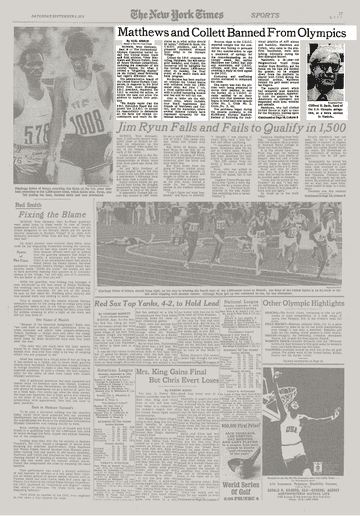MUNICH, West Germany, Sept. 8 — The International Olympic Committee barred today two United States track and field athletes, Vince Matthews and Wayne Collett, from all future Olympic competition, including the remainder of the current Games, for what it termed a “disgusting display” on the victory stand following last night's 400‐meter run.
The administrative board of the United States Olympic Committee, in response to the brief letter from Avery Brundage, I.O.C. president, requested the LO.C. to rescind the action, or review the case and allow the athletes to explain their position.
“We deeply regret that the LO.C. Executive Board did not permit the U.S.O.C. to accept its responsibility to determine all the facts and related circumstances and reach its decision as to what action should be taken,” Clifford H. Buck, the U.S.O.C. president, said in a prepared statement released later today in the Olympic Village.
Unless the I.O.C. reverses its ruling, Matthews, the 400‐meter gold medalist, and Collett the runner‐up will be ineligible for the United States 1,600‐meter relay on Sunday, the final event of the men's track and field program.
No decision has been reached on whether the United States will withdraw from the 1,600meter relay, but John ?? a third quarter‐miler, is ailing with a pulled hamstring muscle and has said he will not run.
Also in limbo are the 400meter relay, which includes four black teammates and friends of Matthews and Collett, and the marathon, where several distance runners have expressed sympathy, for the banned Americans.
Confusing and conflicting stories continued to compound the crisis.
One report was that the athletes were being pressured to revise their position to ease the.burden on a U.S.O.C. already saddled by so many crises here that newsmen have begun to label each new episode Crisis No. 1, Crisis No. 2, Crisis.No. 3, etc.
The problems began during the awards ceremony in the 80,000‐seat Olympic Stadium. Instead of following the traditional practice of stiff silence and humility, Matthews and Collett, who came to the platform barefooted, were seen talking informally, during the Star Spangled Banner.
Matthews, a 24 ‐year ‐old Neighborhood Youth Corps worker from Brooklyn, put his hands on his hips and stroked his goatee. As he stepped down from the platform he shared with Collett during the national anthem, Matthews twirled his gold medal around his fingers.
The capacity crowd, which had rewarded most medalists with polite applause, apparently took the gestures by the Americans as disrespect and responded witth boos whistles and catcalls. today that “no protest gestures” were involved.
But the attitude of the Americans provoked considerable concern by numerous officials, including Douglas F. Roby, an I.O.C. delegate, who made the medal presentation.
Ironically, Roby, from Detroit, also was involved in the controversial case involving Tommie Smith and John Carlos, the two black sprinters whose black‐gloved fists on the victory stand in Mexico City after their race prompted the I.O.C. to strip them of credentials.
“The whole world saw the disgusting display of your two athletes, when they received their gold and silver medals for the 400 M event yesterday,” Brundage said, in his letter to the U.S.O.C.:
“This the second time the U.S.O.C. has permitted such occurences on the athletic field. It is the Executive Board's opinion that these two athletes have broken Rule 26, Paragraph in respect of the traditional Olympic spirit and ethic and are, therefore, eliminated from taking part in any future Olympic competition.
“If such a performance should happen in the future, please be advised that the medals will be withheld from the athletes in question.”
Matthews and Collett met with U.S.O.C. officials this afternoon, presumably to explain theri behavior. Afterward, in commenting on the tone of the meeting, Buck said, “I'm satisfied that they were honest and straightforward in their answers.
“I think it is safe to say that they were not fully aware of the seriousness of what they were doing.”
Asked whether he felt the two athletes now regretted their behavior, Buck replied, “In my opinion, they did.”
Members of the American delegation were divided on the issue. Several boxers and swimmers termed the actions “disgraceful” and “childish.”
Ken Moore, an articulate marathon runner and free‐lance writer, said, however, he regarded the I.O.C. as a “bunch of crotchety old men who haven't slept a lot lately.”
Moore, the representative for distance runners in dealings with the U.S.O.C., said he sat in the stadium, watched the ceremony and “couldn't understand why they [the crowd] were whistling and jeering.
“I know Vince,” Moore continued, surrounded by newsmen outside the United States compound. “He's loose. I know the kind of defiance that comes into these situations. It's a perfectly natural explosion of ebullience. It's the individual. That's Vince Matthews.”
In attempting to analyze the unfavorable reaction that accompanied the victory‐stand gestures, Moore attributed the reaction to public identification with the Olympics.
“People live this thing vicariously,” said Moore, who will join Frank Shorter and Jack Bacheler in Sunday's marathon. “Every sense of their participation will be grasped. It's an understandable thing, but it's wrong. There's a limit to vicariousness.”
About the Archive
This is a digitized version of an article from The Times’s print archive, before the start of online publication in 1996. To preserve these articles as they originally appeared, The Times does not alter, edit or update them.
Occasionally the digitization process introduces transcription errors or other problems; we are continuing to work to improve these archived versions.
See the article in its original context from
September 9, 1972, Page 17Buy Reprints

